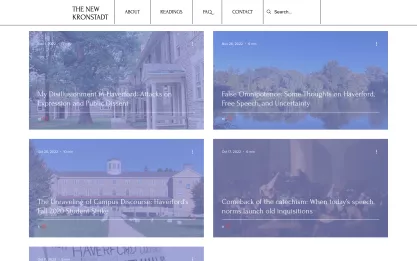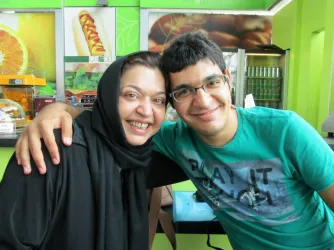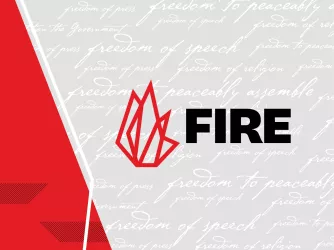Table of Contents
Sounding the FIRE alarm at Haverford College

(Haverford College / Wikimedia Commons)
Founders Hall at Haverford College.
William Harris is a junior at Haverford College and a FIRE Campus Scholar.
The Haverford College community has a proud history of supporting free speech. Steven Pico, the lead plaintiff in the Supreme Court book-banning case Island Trees School District v. Pico, is among the school’s alumni. Cornel West, who once taught at Haverford as a visiting professor and received an honorary degree from the college, has emphasized the importance of free speech to achieving social justice throughout his career. In the 1960s, Haverford students even participated in the Free Speech Movement with support from the school administration, who sponsored buses to transport anti-Vietnam War protesters around the country.
Free speech — the right to express one’s opinions and ideas without fear of retaliation — is a fundamental human right. It is essential for the growth and development of individuals and for the betterment of society. It is also necessary to the pursuit of truth and is the cornerstone of any liberal arts education. However, despite its proud history at my school, it is clear that free speech is not fully valued at Haverford College today.

From Berkeley to Haverford: Have we forgotten the progressive history of free speech on college campuses?
In the 1960s, students at the University of California, Berkeley formed the storied Free Speech Movement.
As a FIRE Campus Scholar, I spent the past semester reaching out to the Haverford community to learn more about student, faculty, staff, and alumni experiences with free speech on campus. Supported by FIRE, I created The New Kronstadt, an online publication dedicated to exploring the connection between free speech and social progress through historical anecdotes and personal narratives written by members of the Haverford community. The publication details how free speech is currently under attack at Haverford and beyond.
The New Kronstadt takes its name from the Kronstadt Rebellion, a historic event in which leftist sailors in the early Soviet Union demanded freedom of speech, press, and association. The rebellion was brutally suppressed by the Bolshevik government, highlighting the dangers of political uniformity as imposed by some leftists onto others. The New Kronstadt seeks to bring attention to this important history and inspire others to echo the sailors’ spirited demands for pluralism and political freedom. True social progress does not mimic past inquisitions and purges, and we need a renewed commitment to liberal democratic values on the American left — particularly when it comes to freedom of speech. The New Kronstadt aims to facilitate these conversations and promote more inclusive and open expressive environments, beginning with the community that its contributors are part of as Haverfordians.
The stories Haverford students, faculty, staff, and alumni described to me are shocking. They demonstrate a serious problem at the college, the extent of which has not been made public until now. Thanks to those who felt comfortable writing publicly on such topics, The New Kronstadt offers evidence of Haverford’s free speech crisis, an issue that continues to go publicly unacknowledged and unaddressed by both administrators and the school’s board of trustees.

Significantly, most of the individuals with whom I spoke over the course of the semester ultimately chose to remain silent, afraid of the consequences of being publicly associated with their stories. In light of the anecdotes provided in my contributors’ articles, this comes as no surprise.
Haverford’s current culture of self-censorship
Students at Haverford have faced intimidation, bullying, and harassment for expressing dissenting views or holding views that differ from the majority — or even a plurality — of the campus community. These incidents have included students incurring removal from extracurricular activities and threats to their physical safety, articles blacklisted from being published in school newspapers, and questions disallowed from being asked to visiting speakers. Such happenings have stifled the open exchange of ideas and hindered the growth and learning of the community.
Some students at Haverford assume that a culture of self-censorship, as encouraged by the student-run Honor Code, achieves the progressive social and political ends that they desire. Yet, as a case study, Haverford proves that free speech on campus isn’t merely a conservative issue. In fact, the numbers suggest that a majority of left-wing students at Haverford self-censor due to the repressive ideological atmosphere on campus. According to data from FIRE’s College Free Speech Rankings, Haverford has seven liberal students for every one conservative student. Yet despite this political homogeneity, 58% of Haverford students say they self-censor, and 77% of Haverford students report anxiety over speaking their minds freely, even in the classroom. For Haverfordians who care about social justice and education, this fact should be alarming. We cannot achieve solidarity, let alone progress and learning, without dialogue.
In choosing to prioritize free speech once again, the college can not only fulfill its mission as a liberal arts institution, but also set an example for other schools and communities on how to recognize, safeguard, and promote a fundamental community value when it is threatened, undermined, and at risk of being lost.
As Jacob Gaba writes in his article for The New Kronstadt, “Without nuanced discussion and debate, and without robust academic freedom, little learning can be accomplished. Our institutions become bastions for indoctrination.” Nick Lasinsky also highlights a culture of intolerance towards those who do not fully support certain movements or ideas on campus. He encourages Haverfordians to reverse this negative culture, writing:
The world is better when we embrace the humility of uncertainty—when we are willing to listen to others, debate them, work to understand them—no matter how immovable our current beliefs feel. This is a fundamental step in any journey to understanding a topic, and a fundamental step of education.
What Gaba and Lasinsky describe should be common sense at one of the top 20 liberal arts colleges in the nation. After all, their words describe fundamental building blocks of the learning process: epistemic humility and Socratic dialogue. Sadly, a belief in pluralism seems all too rare at Haverford. According to the College Free Speech Rankings, only 25% of students at Haverford say shouting down a speaker to prevent them from speaking on campus is never acceptable. Fittingly, Haverford students in 2014 canceled their own commencement speaker, reflecting the school culture’s hostility to dissenting opinions.
In such a repressive speech environment, some students and alumni recognize the necessity of speaking out. As Trevor Stern writes, “I felt called to action. The stifling atmosphere had to be broken apart, and I could think of only one way to do this: public dissent.”
Rebuilding a free speech culture at Haverford
Public pleas for the college to finally take the free speech crisis on its campus seriously must not go ignored. It is crucial that Haverford College takes steps to address the issue of free speech on its campus in order to create a welcoming and inclusive community that values and respects the diverse viewpoints of all its members.
With reflection and resolution for 2023, Haverford College must revitalize its community by making free speech a clearly-articulated institutional priority. This involves adopting and promoting clear policies and guidelines that protect free speech (such as a version of the Chicago Statement), supporting individuals who face censorship, and engaging in ongoing dialogue and education about the importance of free speech. Concrete steps can include training for students and faculty and taking action against those who seek to suppress or intimidate others.

Haverford College should also be transparent about where it may be falling short in terms of supporting free speech. Administrators should actively acknowledge past incidents or controversies related to free speech, and take steps to learn from them and systematically correct the institutional errors made. Haverford claims trust, concern, and respect as its central values — but we have no trust if we cannot even speak to one another openly. By being honest about past mistakes, the college can foster a culture of mutual respect and dialogue among its community members.
One of Haverford’s early presidents, Isaac Sharpless, offered these inspiring words to the graduating class of 1888:
I suggest that you preach Truth and do Righteousness as you have been taught, whereinsoever that Teaching may commend itself to your Consciences and your Judgements. For your Consciences and your Judgements we have not sought to bind; and see you to it that no other Institution, no political Party, no social Circle, no Religious Organizations, no pet Ambitions put such chains on you as would tempt you to sacrifice one Iota of the Moral Freedom of your Consciences or the Intellectual Freedom of your Judgements.
Haverford can still live up to these words. In choosing to prioritize free speech once again, the college can not only fulfill its mission as a liberal arts institution, but also set an example for other schools and communities on how to recognize, safeguard, and promote a fundamental community value when it is threatened, undermined, and at risk of being lost.
Recent Articles
Get the latest free speech news and analysis from FIRE.

FIRE sues Bondi, Noem for censoring Facebook group and app reporting ICE activity

Iran replaced my mother’s voice with silence

Spain considers banning teens from social media and holding tech executives criminally responsible for ‘hate speech’


